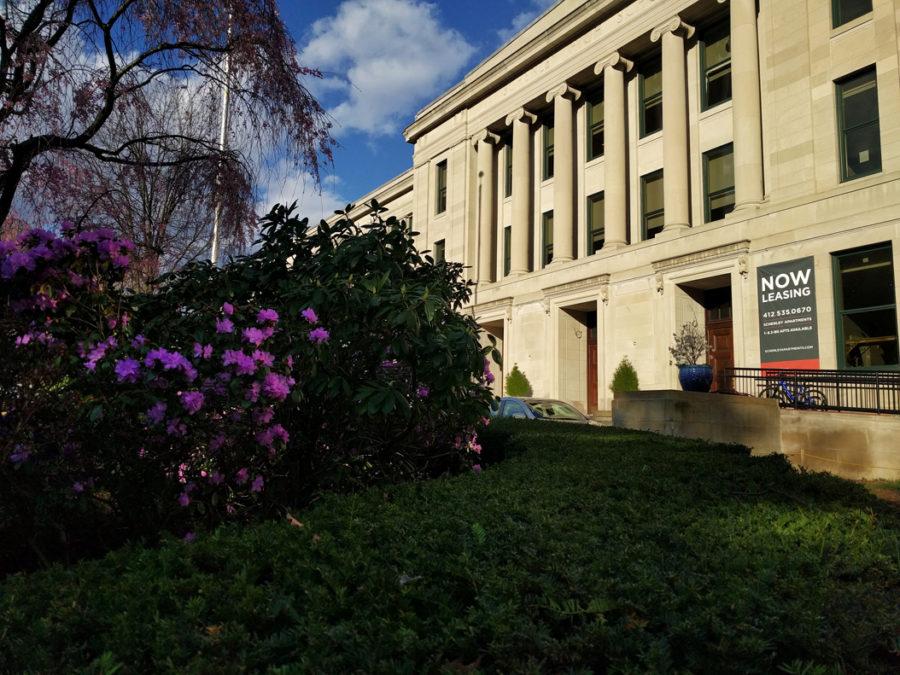The doors of Schenley High School will reopen soon, but to the distaste of some former students, it won’t be for class. Tenants will occupy the former classrooms, which are now converted to luxury apartments.
PMC Property Group is now leasing 180 units in the building with move-in dates starting as soon as July. The Schenley Apartments will contain one- and two-bedroom units, which will start at $1,295 and $1,995, respectively. PMC/Schenley HSB Associates LP purchased the building on Bigelow Boulevard and Centre Avenue from Pittsburgh Public Schools for $5.2 million in 2013.
Schenley High School closed in 2008 when, amid financial troubles, Pittsburgh Public Schools chose to close the school rather than pay the estimated $75 million or more to fix asbestos and other issues. The historic building, which opened in 1916, was very modern for its time. The architect, Edward Stotz, Sr, designed the building with rounded corners and a compact design, bringing the construction costs to over $1 million.
During community planning in 2012, Schenley Farms residents argued about the ideal usage of the building, with many in favor of high-end apartments or condominiums and others in support of student housing. Residents offered these differing views in emails sent to the Schenley Farms Civic Association — a planning group dedicated to maintaining “the neighborhood as an upscale, single family community,” according to their website.
The Schenley Farms Civic Association said in 2015 PMC has “no intention of marketing apartments in this building to students.”
Despite PMC taking out a visual advertisement for the apartments in The Pitt News, Norman Cleary, president of the Schenley Farms Civic Association, said the quality and price of the apartments make them geared less toward students.
“It’s a more upscale development, not to say students shouldn’t rent in the building,” Cleary said. “Many of the Oakland neighborhoods have housing well-suited to lower rents and better-suited to the student markets.”
According to Cleary, the SFCA reached the decision to develop the building as apartments –– instead of condominiums –– in order to preserve the historic building. Condos are considered residential properties and are not eligible for the historic tax credits available for apartments and other commercial properties.
“It became obvious quickly that these folks knew how to develop historic buildings,” he said, noting PMC’s track record in redeveloping historic buildings, including the former Philadelphia School District administrative building. “They’ve become excellent stewards of the building.”
PMC leasing consultant Christopher Girard said demand for leases has been high so far.
“Future tenants have especially liked the original hardwood floors and chalkboards that we were able to preserve,” Girard said in an email to The Pitt News.
Many Schenley High School alumni, however, who learned math and science on those chalkboards, are not thrilled with the new use of the building.
Zach Galuska was in the last class of students to pass through the high school before it closed. He lived in Pittsburgh’s Northside neighborhood and attended Schenley as part of their magnet program — a program that brings in students beyond the normal geographic boundaries of a public school for more rigorous academics. Galuska said Schenley was special because it brought together students from all over Pittsburgh.
“[Schenley] had people from rival neighborhoods sitting together in class, playing cards with each other and laughing,” Galuska said. “That’s something that doesn’t happen. And it did there, every day.”
Galuska said he was also impressed with the economic diversity of students at Schenley High, where he saw “kids from six-figure homes hanging out with kids from the projects.” Now, he said, that diversity is going to disappear.
“They’re luxury apartments — people are paying $1,500 a month to live there,” Galuska said. “How many of those kids are going to go to public schools?”
Galuska said he and other students testified at Pittsburgh Public School board meetings in 2008 to try to keep the school open.
“We walked down after school, and we protested, and we had a lot of support from the community,” Galuska said. “But they already had their minds made up.”
Though many Schenley alumni are frustrated with the outcome of the project, residents in the Schenley Farms area, like Cleary, who lives close to the building, are happy with the development.
“[PMC is] very pleased with the success of the project and how well it’s been received in the neighborhood,” Girard said.


